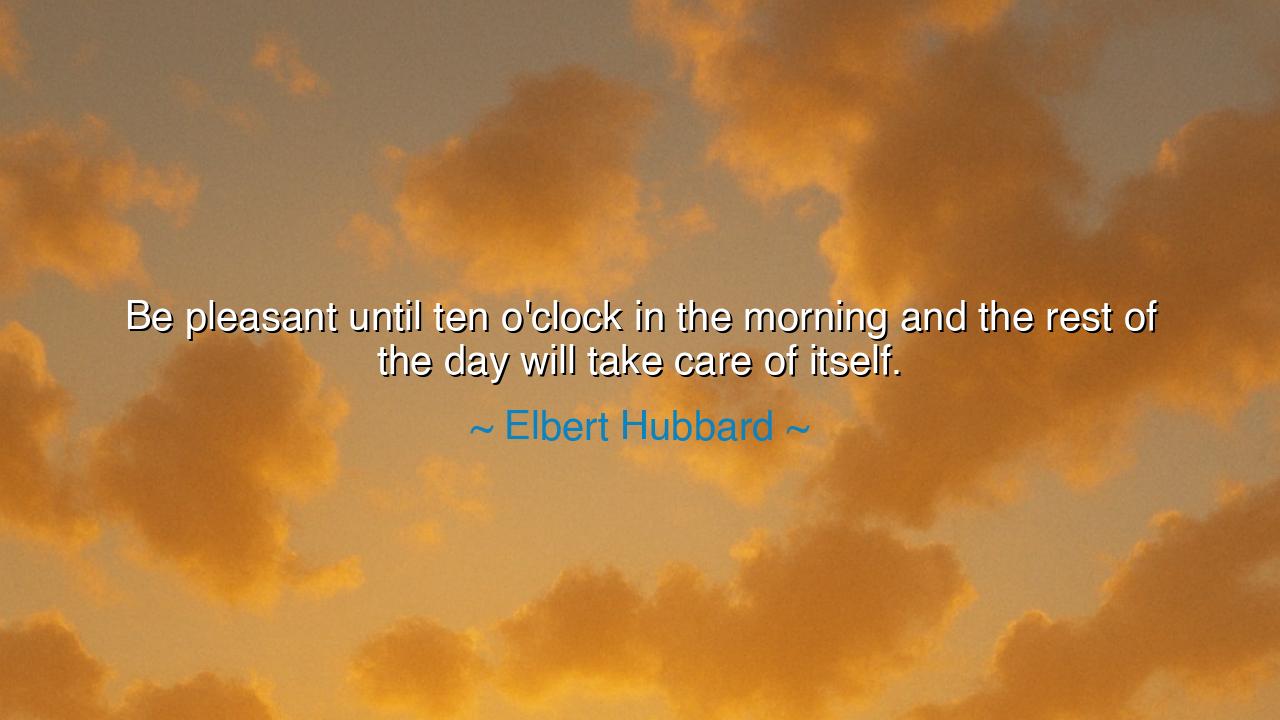
Be pleasant until ten o'clock in the morning and the rest of the
Be pleasant until ten o'clock in the morning and the rest of the day will take care of itself.






The American philosopher and craftsman of words, Elbert Hubbard, once declared: “Be pleasant until ten o’clock in the morning and the rest of the day will take care of itself.” At first, this phrase may sound like lighthearted advice, almost playful in tone. Yet beneath its humor lies a profound understanding of human nature: that the morning is the forge of the day, and the spirit we carry into its earliest hours will shape all that follows. If the heart begins in harmony, the hours ahead unfold with ease; but if the day begins in bitterness, the shadows linger until night.
This quote speaks to the power of attitude. Hubbard knew that men and women are not merely shaped by circumstances but by the spirit with which they greet them. By choosing to be pleasant—calm, kind, optimistic—through those first crucial hours, one sets in motion a chain of goodwill and balance. It is like casting the first stone into a pond: the ripples spread outward until the whole surface is touched. So it is with the morning; the mood of the dawn becomes the echo of the day.
History offers examples of this truth. Consider George Washington, whose habit was to rise early, compose himself with dignity, and carry into his morning a sense of restraint and calm. His soldiers, seeing his steadiness in the face of adversity, took courage from his example. The man who is pleasant in the morning, who does not yield to anger or despair, becomes a wellspring of strength for others. His composure at the start of the day ensures the endurance of his spirit until its end.
Even in ordinary life, this wisdom holds. A teacher who begins the morning with warmth and kindness finds that her students respond with respect throughout the day. A merchant who greets his first customers with patience sets the tone for all his dealings that follow. The earliest hours are a doorway; step through with bitterness, and the day becomes heavy; step through with pleasantness, and the day unfolds with grace. Hubbard’s observation is not a jest—it is a key to harmony.
The meaning of his words is also tied to self-discipline. To be pleasant until ten o’clock requires more than cheer—it requires mastery of the tongue, restraint of impatience, and the deliberate choice to carry light rather than darkness. By practicing this discipline in the early hours, one learns the greater art of self-control. And once the habit is formed, the day becomes easier, for momentum carries forward what the morning has begun.
The lesson for us is clear: guard the spirit of your morning. Do not rush into the day with haste or anger. Instead, begin with kindness—to yourself, to those around you, to the tasks before you. If you can hold this pleasantness, even for a few hours, you will discover that the rest of the day flows more smoothly, as though guided by an unseen hand. Practical action is simple: smile, breathe, show patience, and resist the urge to quarrel in those first hours. These small acts will transform the shape of your day.
Thus, Elbert Hubbard’s quote stands as a beacon of simple yet profound wisdom. It teaches that the key to a good life lies not only in grand deeds but in small beginnings, in mastering the first hours so that all the rest may follow in peace. Let us then take his counsel to heart: rise with calm, walk into the morning with pleasantness, and watch as the day, like a river, carries itself toward joy. For he who governs the morning, governs the day; and he who governs the day, governs his life.






AAdministratorAdministrator
Welcome, honored guests. Please leave a comment, we will respond soon